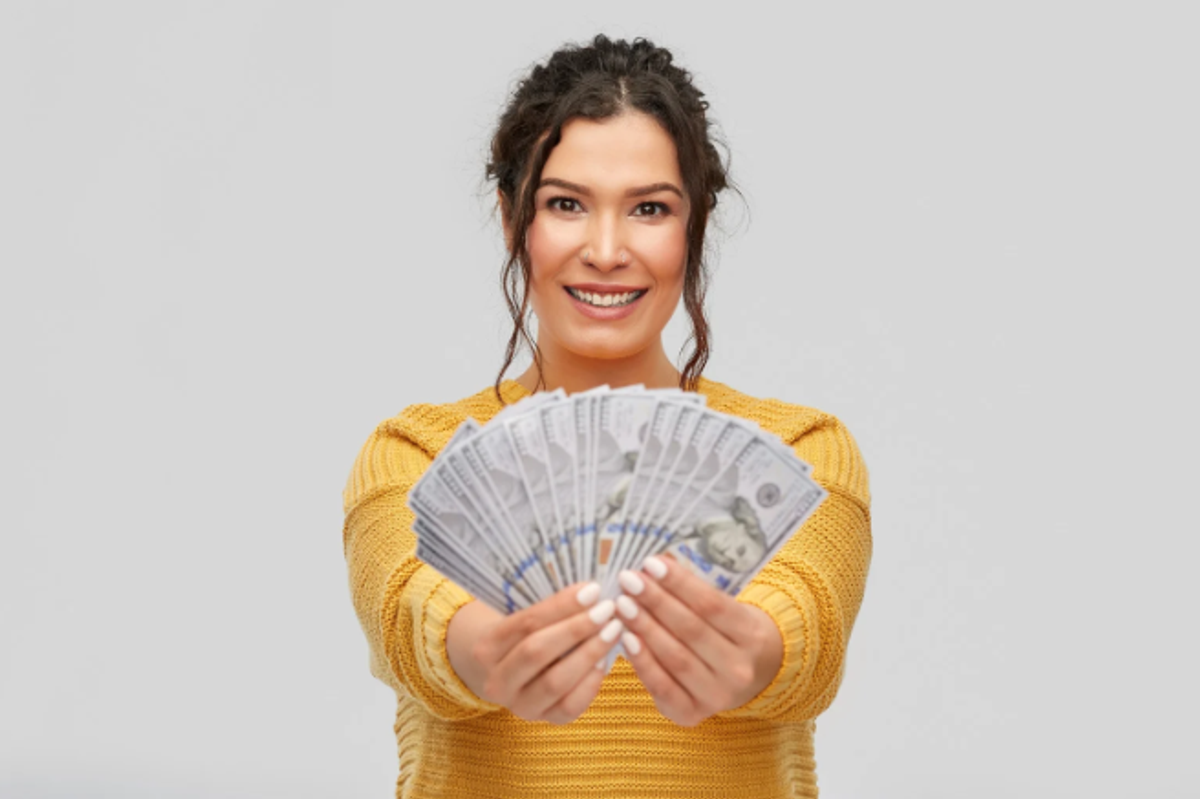If all the money in America was equally redistributed overnight, how much would you get?
If only it were this simple.
If we took all the wealth in America and split it equally, how much money would each person get?
There are few things more frustrating than America's enormous wealth inequality. Consider that the United States has more money held by private citizens than any other country in the world. According to the Federal Reserve, U.S. households hold a total of $160.35 trillion, which is the value of each person’s assets minus their liabilities. However, many Americans are perplexed by the fact that, in a country with such wealth, so many people still struggle to make ends meet.
Although Americans hold the largest amount of privately held wealth in the world, many of us still struggle with financial stress. A recent report found that 68% don’t have enough money to retire, 56% are struggling to keep up with the cost of living, and 45% are worried about their debt levels. A significant reason is that a small number of people hold a large portion of the privately held wealth in the U.S..
Nearly two-thirds of America’s private wealth is held by the top 10% of people, leaving the remaining one-third to be divided among 90% of the population. For reference, the richest man in the world, Elon Musk, is currently worth about $681 billion; a truly mind-numbingly, staggeringly large number.
What if there were a radical way of fixing the problem?
- YouTube www.youtube.com
What would happen if America divided its privately held money evenly?
With so many people struggling in America, while a few at the top are unbelievably wealthy, what would happen if the money were magically divided evenly among the 340 million people who live in the United States?
If everyone received a truly equal share of the American pie, every person would receive approximately $471,465. That’s $942,930 per couple and $1.89 million for those with two kids.
That would be a life-changing windfall for a large majority of Americans.
With that chunk of change, the couple could easily pay off the average U.S. mortgage and have plenty of resources to save for a good retirement and send both kids to a decent college or trade school. They'd have no trouble buying groceries and putting food on the table, affording a car, and taking regular vacations.
The billionaire who once had more assets than they knew what to do with, on the other hand, would probably have to move into a middle-class neighborhood.

Of course, beyond just the logistical and ethical hurdles that make a move like this essentially impossible, it might not even be a good idea. Such a drastic redistribution of wealth would be cataclysmic for the economy, as people would have to liquidate their investments to give their assets to others. The sudden increase in wealth for many, without a corresponding increase in goods and services, would lead to incredibly high inflation. The dramatic reconfiguring of the economy would also disincentivize some from working and others from innovating.
Some posit that if everyone were equal, in just a few months, those with wealth-generating skills would immediately begin rising to the top again, while others would fall behind, and in a few generations we'd be right back where we started. Without a deeper, more fundamental change to our system of capitalism, a one-off radical redistribution of wealth wouldn't stick, most likely.
What programs actually do reduce poverty?
Although it seems that a massive redistribution of wealth isn’t in the cards for many reasons, we do have some evidence from recent history on how programs that give people money can help lift them out of poverty.
Government stimulus programs during the COVID-19 pandemic brought the U.S. poverty level to a record low of 7.8% in 2021. Child poverty was also helped by the American Rescue Plan’s Child Tax credit expansion, which drove child poverty to an all-time low of 5.2%. It’s also worth noting that the trillions in government stimulus had a downside, as it was partially responsible for a historic rise in inflation.
Another popular idea for reducing poverty is providing citizens with a Universal Basic Income. It's a concept that has been tested in several places, even in America, usually with good results. Experiments have generally shown an increase in health, life satisfaction, and even full-time employment for people who received "free guaranteed money" from UBI.
Finally, there's philanthropy. Many millionaires and billionaires give a small portion of their wealth to charities, but a select few have pledged to give away the vast majority of their fortune before their lifetime comes to an end. Bill Gates, and Warren Buffett are just two notable examples of billionaires who are set to give away more than $600 billion in the next several decades.
- YouTube www.youtube.com
While for many, the notion that there are billionaires while others can hardly get by feels obscene, redistributing America’s wealth is more of a thought experiment than something that would realistically happen. But it highlights an important truth: massive wealth inequality exists in the world’s wealthiest nation. While perfect equality will never exist, that shouldn't stop us from making targeted efforts to reduce poverty that make a meaningful difference in people’s lives.
This article originally appeared in July. It has been updated.
- A 'Daily Show' correspondent asks a millionaire about inequality and gets an unexpected response. ›
- NFL star Malcolm Jenkins is working to bridge the ethnic wealth gap by giving kids real money to invest ›
- Unique visualization of the wealth gap shows what your salary looks like stacked in $5 bills ›
- A guy and his friends shared their travel plans. The results perfectly explain the wealth gap. ›

